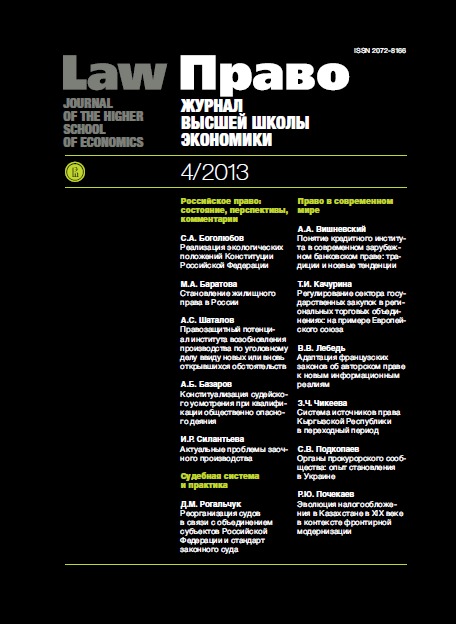Topical Problems of Legal Procedure by Default
Abstract
The paper examines specific features of legal procedure by default. This procedure promotes to ensuring access to justice, eliminating the possibility of intentional delay in the process, without affecting the procedural guarantees. The special attention is given to the problems which arise at the stage of applying this institution. The study covers the questions of legality of the given decisions, cases of plurality of subjects both on behalf of the claimant and on behalf of the defendant, problems relating to the participation of remedial claimants. The article analyzes the problems of applying a default legal procedure and the prospects of its application. It is noted that the default legal procedure cannot be considered a simplified or abridged procedure, as it fully complies with the procedural form and examines all the evidence. It is carried out by the general rules of the trial, established by Chapter 15 of the Code of Civil Procedure of the Russian Federation, but with some features provided by Chapter 22 of the Code of Civil Procedure of the Russian Federation. The decision default has the same legal effect as the one adopted in a regular procedure. This is not an independent, separate but civil procedure. It is concluded that this type of proceeding complies with the principle of competition. The trial is held in a regular manner, examines all of the evidence, the parties know each other's positions. Besides, legal procedures by default provide for additional guarantees for the absent defendant, i.e. restricting some powers of the claimant — the right to increase the size of the claim and a change in the claim. Legal procedure by default may seem one-sided, but it is only the result of the defendant's actions. Talking it into account, the defendant is entitled to cancel the decision by default in a simplified form. The article states that the legislative regulation of the legal procedure by default has significant flaws. Commentaries of the Plenum of the Supreme Court of the Russian Federation would facilitate the application of this institution. The effectiveness and necessity of the institution is supported by statistics.
References
Argunov V. (1997) Zaochnoe Proizvodstvo i sudebnoe reshenie [Legal Proceeding by Default a Court Decision], Khozyaistvo i pravo — Business and law, no 2, pp. 23-24.
Bugaevskiy A. (1924) Grazhdanskiy protsess v dvizhenii [Civil Process in Action], Leningrad.
Chernykh I. (2000) Zaochnoe proizvodstvo v grazhdanskom protsesse [Legal Proceedings by Default in a Civil Process], Moscow, Yurayt, pp. 19-21.
Gedda A. (1910) Nedobrosovestnosť storon v grazhdanskom protsesse [Dishonesty of Parties in a Civil Process]. Zhurnal Ministerstva justitsii — Journal of the Justice Ministry, no 1, pp. 26-27.
Izvarina A. (1999) Akty sudov obshchey jurisdiktsii. (Avtoref. diss. kand. jurid. nauk) [Decisions of Courts of General Jurisdiction. PhD Thesis]. Moscow, MSLA, pp. 8-9.
Lonskaya S. (2002) Zaochnoe reshenie v grazhdanskom protsesse: trebuyutsya utochneniya [Decisions by Default in Civil Process: explanations are required], Rossiiskaya Yustitsiya — Russian Justice, no 3, pp. 9-10.
Makarov A. (2004) O srokakh vstupleniya zaochnogo resheniya v zakonnuyu silu [On the Term of Entering Default Decisions into Force], Rossiiskaya Yustitsiya — Russian Justice, no 2, pp. 14-15.
Moleva G. (1993) Pravo na sudebnuyu zashchitu otvetchika. (Diss. Kand. Jurid. Nauk) [Right to defence in Court for Defendants. PhD Thesis], Saratov, Saratov State University, pp. 10-11.
Reshetnyak V, Cernykh I. (2003) Zaochnoe reshenie v grazhdanskom protsesse [Decision by Default in a Civil Process], Moscow, Gorodets, pp. 16-18.
Utkina I.V (2003) Zaochnoe reshenie v grazhdanskom protsesse [Decision by Default in a Civil Process], Moscow, Norma, pp. 173-174.
Copyright (c) 2013 Law Journal of the Higher School of Economics

This work is licensed under a Creative Commons Attribution-ShareAlike 4.0 International License.


















